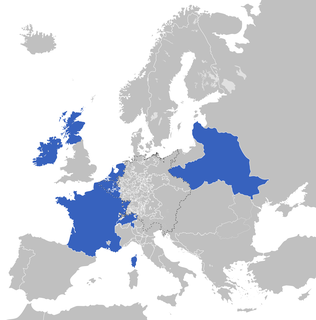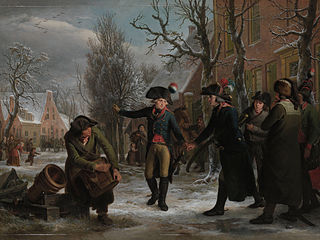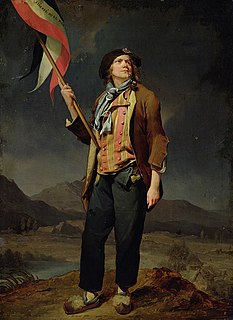 W
WThe American Revolution was an ideological and political revolution which occurred in colonial North America between 1765 and 1783. The American Patriots in the Thirteen Colonies defeated the British in the American Revolutionary War (1775–1783), gaining independence from the British Crown and establishing the United States of America, the first modern constitutional liberal democracy.
 W
WThe Atlantic Revolutions were a revolutionary wave in the late eighteenth and early nineteenth centuries. It was associated with the Atlantic World during the era from the 1760s to the 1870s.
 W
WThe Batavian Revolution was a time of political, social and cultural turmoil at the end of the 18th century that marked the end of the Dutch Republic and saw the proclamation of the Batavian Republic. The period of Dutch history that followed the revolution is referred to as the "Batavian-French era" (1795–1813) even though the time spanned was only 20 years, of which three were under French occupation under Napoleon Bonaparte.
 W
WThe Brabant Revolution or Brabantine Revolution, sometimes referred to as the Belgian Revolution of 1789–90 in older writing, was an armed insurrection that occurred in the Austrian Netherlands between October 1789 and December 1790. The revolution, which occurred at the same time as revolutions in France and Liège, led to the brief overthrow of Habsburg rule and the proclamation of a short-lived polity, the United Belgian States.
 W
WThe British Agricultural Revolution, or Second Agricultural Revolution, was the unprecedented increase in agricultural production in Britain due to increases in labour and land productivity between the mid-17th and late 19th centuries. Agricultural output grew faster than the population over the century to 1770, and thereafter productivity remained among the highest in the world. This increase in the food supply contributed to the rapid growth of population in England and Wales, from 5.5 million in 1700 to over 9 million by 1801, though domestic production gave way increasingly to food imports in the nineteenth century as the population more than tripled to over 35 million. The rise in productivity accelerated the decline of the agricultural share of the labour force, adding to the urban workforce on which industrialization depended: the Agricultural Revolution has therefore been cited as a cause of the Industrial Revolution.
 W
WThe French Revolution began in May 1789 when the Ancien Régime was abolished in favour of a constitutional monarchy. Its replacement in September 1792 by the First French Republic led to the execution of Louis XVI in January 1793, and an extended period of political turmoil. This culminated in the appointment of Napoleon as First Consul in November 1799, which is generally taken as its end point. Many of its principles are now considered fundamental aspects of modern liberal democracy.
 W
WThe Haitian Revolution was a successful insurrection by self-liberated slaves against French colonial rule in Saint-Domingue, now the sovereign state of Haiti. The revolt began on 22 August 1791, and ended in 1804 with the former colony's independence. It involved blacks, mulattoes, French, Spanish, and British participants—with the ex-slave Toussaint Louverture emerging as Haiti's most charismatic hero. The revolution was the only slave uprising that led to the founding of a state which was both free from slavery, and ruled by non-whites and former captives. It is now widely seen as a defining moment in the history of the Atlantic World.
 W
WThe Liège Revolution, sometimes known as the Happy Revolution, started on 18 August 1789 and lasted until the destruction of the Republic of Liège and re-establishment of the Prince-Bishopric of Liège by Austrian forces in 1791. The Liège Revolution was concurrent with the French Revolution and its effects were long-lasting and eventually led to the abolition of the Bishopric of Liège and its final annexation by French revolutionary forces in 1795.
 W
WThe sans-culottes were the common people of the lower classes in late 18th-century France, a great many of whom became radical and militant partisans of the French Revolution in response to their poor quality of life under the Ancien Régime. The word sans-culotte, which is opposed to that of the aristocrat, seems to have been used for the first time on 28 February 1791 by officer Gauthier in a derogatory sense, speaking about a "sans-culottes army". The word came in vogue during the demonstration of 20 June 1792.
 W
WThe Tây Sơn Wars, often known as the Vietnamese civil war of 1771-1802 were a series of military conflicts association followed the Vietnamese peasant uprising of Tây Sơn led three brothers Nguyễn Nhạc, Nguyễn Huệ, and Nguyễn Lữ. They began in 1771 and end in 1802 when Nguyễn Phúc Ánh or Emperor Gia Long, an descendant of the Nguyễn lord, defeated the Tay Son and reunited Đại Việt, then renamed the country to Vietnam.